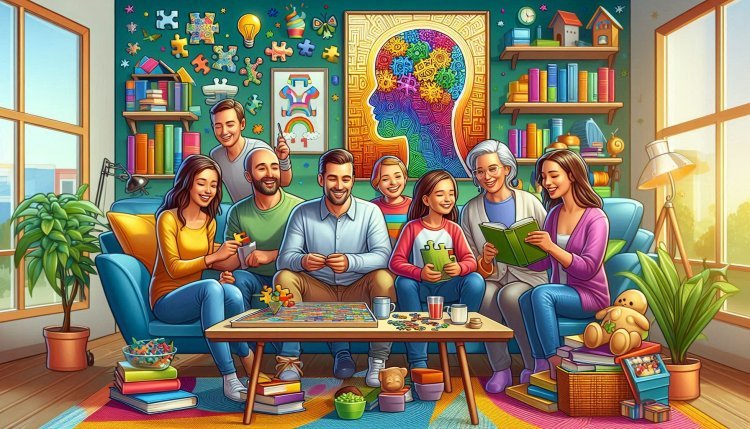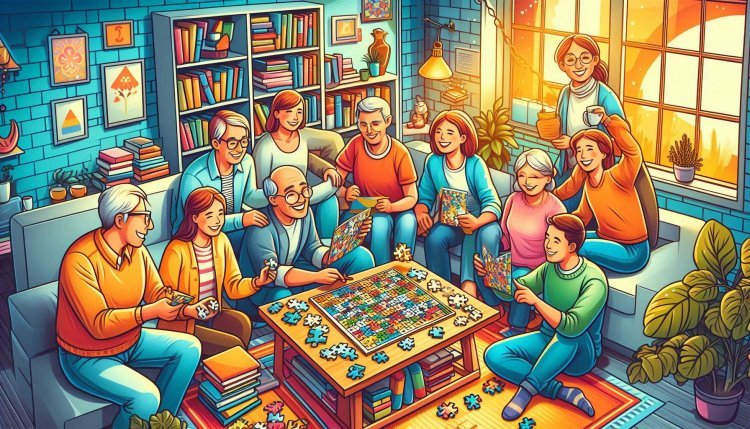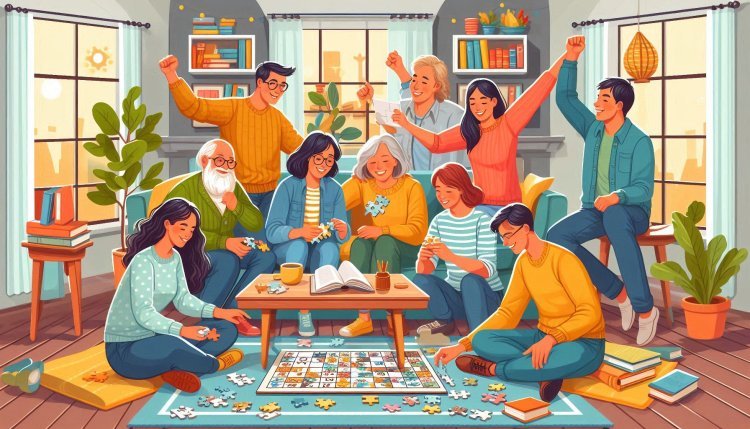Puzzle games have been a staple in the gaming industry for decades, captivating players with their challenging mechanics, engaging narratives, and rewarding solutions.
Before diving into the design process, it's important to understand why puzzle games are so popular. Puzzle games appeal to a wide audience because they are easy to pick up but challenging to master. They often require critical thinking, creativity, and patience, making them both mentally stimulating and satisfying to complete.
Why Puzzle Games Are Good for You: The Surprising Benefits of Playing Puzzle Games
Puzzle games have been a beloved pastime for generations, captivating players with their challenging mechanics and rewarding solutions. From classic jigsaw puzzles to modern digital games like Tetris and Candy Crush, puzzle games offer more than just entertainment—they provide a wide range of cognitive, emotional, and social benefits. In this article, we’ll explore why puzzle games are good for you and how they can positively impact your mental health, problem-solving skills, and overall well-being.
1. Boost Cognitive Function
One of the most significant benefits of puzzle games is their ability to enhance cognitive function. Engaging in puzzle-solving activities stimulates the brain, improving memory, concentration, and critical thinking skills. Here’s how puzzle games can sharpen your mind:
Improve Memory
Puzzle games often require players to remember patterns, sequences, or rules. For example, games like Sudoku or Crossword Puzzles challenge your memory and recall abilities, helping to strengthen neural connections in the brain.

Enhance Problem-Solving Skills
Puzzle games are designed to present challenges that require logical thinking and creativity to solve. By tackling these challenges, players develop better problem-solving skills that can be applied to real-life situations.
Increase Attention Span
Many puzzle games demand focus and attention to detail. Whether you’re matching colors in Candy Crush or navigating a maze in Monument Valley, these games train your brain to concentrate for extended periods.
2. Reduce Stress and Anxiety
In today’s fast-paced world, stress and anxiety are common challenges. Puzzle games offer a therapeutic escape, allowing players to unwind and relax. Here’s how puzzle games can help reduce stress:
Promote Mindfulness
Puzzle games require players to focus on the task at hand, creating a sense of mindfulness. This focused attention can help distract from worries and promote a state of calm.
Provide a Sense of Accomplishment
Solving a challenging puzzle can be incredibly satisfying. The sense of achievement that comes from completing a puzzle releases dopamine, a neurotransmitter associated with happiness and relaxation.
Offer a Mental Break
Puzzle games provide a mental break from daily stressors. Whether you’re solving a jigsaw puzzle or playing a digital game, the immersive nature of puzzles can help you temporarily disconnect from stress.
3. Improve Mood and Emotional Well-Being
Playing puzzle games can have a positive impact on your mood and emotional well-being. The combination of mental stimulation and relaxation can help improve your overall outlook on life. Here’s how:
Combat Boredom
Puzzle games are an excellent way to combat boredom. They provide a fun and engaging activity that keeps your mind active and entertained.
Foster a Positive Mindset
The challenges presented in puzzle games encourage a growth mindset. Overcoming obstacles and solving puzzles can boost your confidence and foster a positive attitude.
Encourage Social Interaction
Many puzzle games, such as Codenames or Escape Room games, are designed for multiplayer experiences. Playing these games with friends or family can strengthen relationships and create lasting memories.

4. Enhance Spatial Reasoning and Visual Perception
Puzzle games often involve manipulating shapes, patterns, or objects, which can improve spatial reasoning and visual perception. These skills are essential for tasks like reading maps, assembling furniture, or even driving. Here’s how puzzle games can help:
Develop Spatial Awareness
Games like Tetris or Portal require players to visualize and manipulate objects in space. This type of gameplay enhances spatial awareness and helps you better understand the relationship between objects.
Improve Visual Perception
Puzzle games that involve matching colors, shapes, or patterns can sharpen your visual perception. This skill is particularly useful in fields like design, architecture, and engineering.
5. Support Brain Health and Longevity
Research suggests that engaging in mentally stimulating activities, such as puzzle games, can support brain health and reduce the risk of cognitive decline. Here’s how puzzle games contribute to long-term brain health:
Delay Cognitive Aging
Regularly playing puzzle games can help keep your brain active and engaged, potentially delaying the onset of age-related cognitive decline. Studies have shown that mentally stimulating activities can reduce the risk of conditions like Alzheimer’s disease.
Promote Neuroplasticity
Neuroplasticity refers to the brain’s ability to adapt and form new neural connections. Puzzle games challenge the brain, promoting neuroplasticity and helping to maintain cognitive flexibility.
6. Teach Patience and Perseverance
Puzzle games often require patience and perseverance to solve. These qualities are not only valuable in gaming but also in everyday life. Here’s how puzzle games can teach these important traits:
Encourage Trial and Error
Many puzzle games involve trial and error, teaching players to learn from their mistakes and keep trying until they find a solution. This mindset can be applied to real-life challenges.
Build Resilience
Facing difficult puzzles and overcoming them can build resilience. Players learn to stay determined and persistent, even when faced with obstacles.
7. Provide Educational Value
Puzzle games are not just fun—they can also be educational. Many puzzle games are designed to teach specific skills or concepts, making them a valuable tool for learning. Here’s how puzzle games can be educational:
Teach Problem-Solving Strategies
Puzzle games often require players to use specific strategies to solve problems. These strategies can be applied to academic subjects like math, science, and logic.
Introduce New Concepts
Some puzzle games are designed to introduce players to new concepts or ideas. For example, games like The Witness explore themes of perception and reality, while Human Resource Machine teaches programming basics.
8. Foster Creativity and Innovation
Puzzle games encourage players to think outside the box and come up with creative solutions. This type of thinking can foster innovation and creativity in other areas of life. Here’s how:
Encourage Divergent Thinking
Divergent thinking is the ability to generate multiple solutions to a problem. Puzzle games often require players to explore different approaches, promoting this type of thinking.
Inspire New Ideas
The challenges presented in puzzle games can inspire new ideas and perspectives. Players may find themselves applying creative solutions from games to real-world problems.
9. Improve Hand-Eye Coordination
Many puzzle games, especially digital ones, require precise movements and quick reflexes. This can improve hand-eye coordination and fine motor skills. Here’s how:
Enhance Reflexes
Games like Bejeweled or Tetris require quick thinking and fast reactions, helping to improve reflexes and coordination.
Develop Fine Motor Skills
Manipulating objects in puzzle games, such as dragging pieces or rotating shapes, can enhance fine motor skills and dexterity.
10. Offer a Sense of Community
Puzzle games can bring people together, fostering a sense of community and connection. Whether you’re solving a puzzle with friends or competing in an online leaderboard, puzzle games can create shared experiences. Here’s how:
Strengthen Relationships
Playing puzzle games with friends or family can strengthen relationships and create bonding opportunities.
Connect with Like-Minded Individuals
Online puzzle games often have communities of players who share tips, strategies, and experiences. This can create a sense of belonging and connection.
Conclusion
Puzzle games are more than just a source of entertainment—they offer a wide range of benefits for your mental, emotional, and social well-being. From boosting cognitive function and reducing stress to fostering creativity and improving hand-eye coordination, puzzle games provide a holistic approach to mental fitness. Whether you’re a casual player or a dedicated enthusiast, incorporating puzzle games into your routine can have a positive impact on your life.
So, the next time you pick up a puzzle game, remember that you’re not just having fun—you’re also investing in your brain health and overall well-being. Whether it’s a quick round of Candy Crush or an immersive session of The Witness, puzzle games are a rewarding and beneficial activity for players of all ages. Start playing today and experience the many benefits that puzzle games have to offer!
What's Your Reaction?















